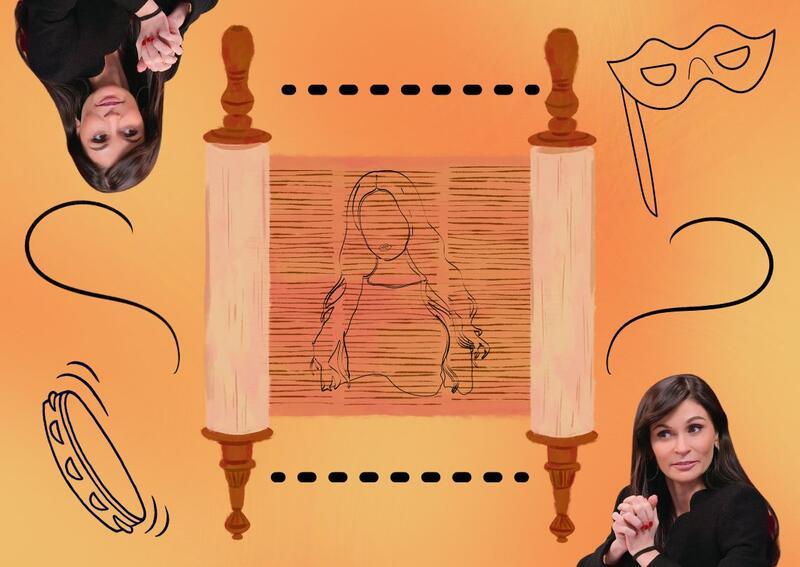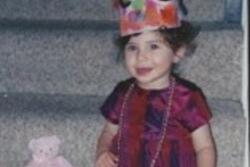Julia Haart: The Anti-Esther
The Jewish holiday of Purim is approaching. One of the central practices of the holiday is reading Megillat Esther. It tells the story of a capricious and licentious king, Achashverosh, who ruled over ancient Persia and surrounding territories, the attempts by his evil advisor to manipulate the king into killing the Jews of the realm, and the incredible actions of a couple of Jews to save their people. It’s one of the Torah’s most accessible texts, complete with a Disney-ready story (right down to the blundering sidekicks, Bigtan and Teresh). The undoubted heroine of the story is Queen Esther, a Jewish woman who rose to power from humble beginnings, which makes me think of a current Jewish woman with a superficially similar path.
No, I’m not talking about Janet Yellen or Sheryl Sandberg. I’m talking about Julia Haart, star of My Unorthodox Life. The differences between Esther and the megillah, on one hand, and Haart and her show, on the other, sharpen my own views on how feminism can be used to raise up other Jews or tear them down.
Queen Esther is depicted in the megillah as a self-sacrificing leader. Through action and prayer, she marries the king, rises to power, and uses that power to save her own people. She represents a woman who wields power and influence for the greater good of others. Ultimately, it is this self-sacrifice and service that makes her the primary heroine of the Purim story.
My Unorthodox Life follows Julia Haart as she navigates leaving behind her Ultra-Orthodox background for a fabulously wealthy and thoroughly secular lifestyle. Haart rose through the ranks of the fashion world, became the CEO of the Elite World modeling agency, and married the agency’s billionaire owner (although, in the second season, she divorces him and loses her CEO position).
Haart says she participated in the Netflix reality show specifically for the purpose of discussing her religious transition. Unfortunately, rather than use her platform for good, she spends much of her show denigrating a large segment of the Jewish community. If she felt she needed to change her life for her mental health, then good for her. However, across the two seasons of her show, she does not give any advice to people who want to leave the Ultra-Orthodox community or show much interest in helping pretty much any Jew of any stripe. Sometimes she goes further, vilifying her own children because they hang on to some of her former religious practices (to say nothing of the practices of her apparently still-religious first ex-husband).
Queen Esther used her power to save and lift up other Jews. That’s my version of Jewish power and feminism. Haart, though, uses her power as a weapon against other Jews. Esther seems shy about rising to power and ambivalent about using it. She does not beautify herself, like other women did, before appearing before the king as part of his quest for a new wife, and shows little interest in becoming queen at all. In contrast, Haart stars in her reality show seemingly as a megaphone to project her own power and increase her fame. Haart’s decision to leave her childhood community can’t be questioned. She is entitled to do what she feels is necessary to improve her own life and wellbeing. However, it’s hard to similarly justify creating a reality show about it. Ultimately, My Unorthodox Life takes matters too far, wielding Haart’s own anecdotal experience and unchallenged views as a weapon, amplifying her own voice for little purpose other than hurting others and perpetuating grudges.
Perhaps the sharpest distinction between what makes Esther sympathetic and Haart unsympathetic is their respective treatment of their own families. Esther has a famously close relationship with her cousin Mordechai and they work well in tandem to further their goals. She listens to Mordechai’s advice, pushes back on aspects she feels won’t work, presents her own plan, and they adopt that modified plan together. Family interests are valued and considered. Haart, on the other hand, shows little care for even her own children. You see this in the way she treats her son Aaron. Aaron, unlike Julia and her other three children, is still part of a religious Jewish community. In the second season, Aaron tells Haart that he wants to go to yeshiva and become a rabbi. Julia responds to him in a very close-minded way. You would think Haart would be more sensitive to his decision because of her claims of facing hostility from Ultra-Orthodox Jews when she decided to leave. However, she doesn’t respond with sensitivity or understanding. She shuts him down and the scene ends with Aaron crying.
Haart doesn’t reserve all her torment for her most religious child. In one scene, Haart asks her children what they think of a draft of her book. Her daughter Batsheva seems understandably horrified by intimate details Haart has included about Batesheva’s marital sex life. Haart seems remorseless when Batsheva objects. She similarly brings up extremely private details of her daughters’ sex lives in front of others. Esther listens to and is considerate to her family, a supremely Jewish value. Haart could not be more different. Haart proclaims in the last episode that the people she loves are the most important thing in her life. That may be true, but it’s hard to watch My Unorthodox Life and come away with any conclusion other than that the one person she truly loves is herself.
To me, feminism is most powerful when it is exercised for the benefit of the common good, and not at the expense of others. In that regard, It’s hard to ignore the difference in where we leave Esther and Julia Haart at the end of their journeys. Esther has saved the Jews of Shushan, and Purim is set up as a permanent remembrance of what she helped bring about. At the end of the last episode of My Unorthodox Life, Haart’s second husband has left her, they’re suing each other, she has lost her CEO position, says she is “fighting for my freedom and my life,” and, most tellingly, claims that it “feels like I’m right back in Monsey where I started.” Esther has changed the world and improved her own situation in the process. Haart has hurt the people around her and from her former community, and feels like she’s back in the place she was trying to escape in the first place. Esther is a feminist icon in her kingdom. Haart is a feminist icon only in her own imagination.
This piece was written as part of JWA’s Rising Voices Fellowship.







